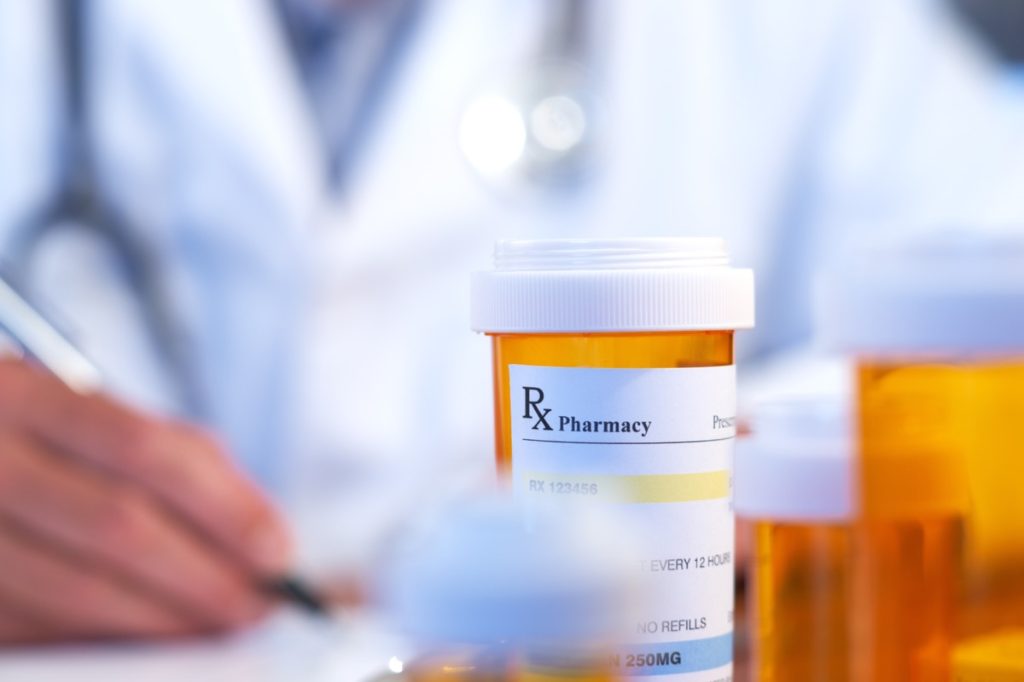Thyroid Medication Recalled, FDA Says in New Warning

Medications can be a powerful tool in treating chronic conditions, helping control everything from blood pressure to persistent pain. One of the more common ailments where prescriptions are effective is hypothyroidism, which affects five out of every 100 people in the U.S. over the age of 12, according to the National Institutes of Health (NIH). The condition is most common in people older than 60 and is more likely to affect women. But if you’re one of the many who takes medication to manage it, you should be aware that the Food & Drug Administration (FDA) has recalled a thyroid prescription over serious health concerns. Read on to find out about the latest medication recall.
READ THIS NEXT: Popcorn Sold In 9 States Recalled Over Health Concerns, FDA Warns.
The FDA just announced a major recall of thyroid medication.

On Feb. 1, the FDA announced that IBSA Pharma Inc. had issued a voluntary recall of specific lots of its TIROSINT-SOL (levothyroxine sodium) Oral Solution medication. The 27 affected batches are listed on the agency’s notice, including the NDC numbers, lot numbers, and expiration dates that consumers can use to identify them.
The agency says that doctors prescribe TIROSINT-SOL for the treatment of hypothyroidism as replacement therapy. It’s also used in pituitary thyrotropin suppression as part of a lineup of treatments for certain types of thyroid cancer.
The FDA describes the medicine as “a clear, colorless to slightly yellow solution supplied in a 1 milliliter white, non-transparent, unit-dose ampule” with the dosage strength identified on each box and pouch along with a distinct color designated to each strength level.
The company discovered some potential issues with the drug’s potency.

According to the FDA’s recall notice, IBSA Pharma Inc. recalled the medication after it found that the lots in question could be subpotent, or lower in dosage strength than listed. The company’s analysis showed a slight decrease below 95 percent of the amount of levothyroxine sodium in the affected medicine.
The agency warns that patients taking the lower dosage medication could begin to feel the immediate symptoms of hypothyroidism, which include “fatigue, increased sensitivity to cold, constipation, dry skin, puffy face, hair loss, slow heart rate, depression, swelling of the thyroid gland and/or unexplained weight gain or difficulty losing weight.”
In the long term, the incorrect dosage could lead to other problems, such as adverse effects on growth and development, heart function, bone metabolism, reproductive function, cognitive function, emotional state, gastrointestinal function, and glucose and lipid metabolism.
RELATED: For more up-to-date information, sign up for our daily newsletter.
Here’s what you should do if you’re currently taking the recalled thyroid medication.

The FDA reports that IBSA Pharma Inc. is in the process of alerting wholesalers, distributors, and healthcare providers about the recall. However, the agency advises anyone who is currently taking TIROSINT-SOL not to discontinue taking it without first speaking to their healthcare provider to discuss a possible replacement.
So far, there have been no reports of any adverse reactions or medical emergencies related to the recalled medicine. But anyone taking the medication who feels they’re experiencing problems—including pregnant people, newborn infants, and elderly patients—should contact their doctor or healthcare provider immediately.
Any patients with questions or concerns can also reach IBSA Pharma Inc. by calling the hotline or contacting the email address listed on the FDA’s recall notice.
There have been other recent medication recalls.

This isn’t the only recent incident involving the recall of a medication. On Dec. 21, 2022, the FDA announced that Lupin Pharmaceuticals had voluntarily recalled four lots of Quinapril tablets, which is an angiotensin-converting enzyme (ACE) inhibitor used to lower blood pressure in patients with hypertension.
The agency reported that testing found the “presence of a nitrosamine impurity,” called N-Nitroso-Quinapril, that was above the Acceptable Daily Intake (ADI) level. And while people are commonly exposed to nitrosamines in “water and foods, including cured and grilled meats, dairy products, and vegetables,” they can increase the risk of cancer at higher levels over time. Patients were instructed to contact their doctor or pharmacy while continuing to take the medication.
Authorities flagged another blood pressure medication on Oct. 24, when the FDA announced that New Jersey-based Aurobindo Pharma USA, Inc. had issued a voluntary recall on two specific lots of its Quinapril and Hydrochlorothiazide Tablets USP 20mg / 12.5mg. This instance also involved the discovery of N-Nitroso-Quinapril in the medicine, with the agency again advising patients to continue taking it while contacting their doctor or healthcare provider as soon as possible.